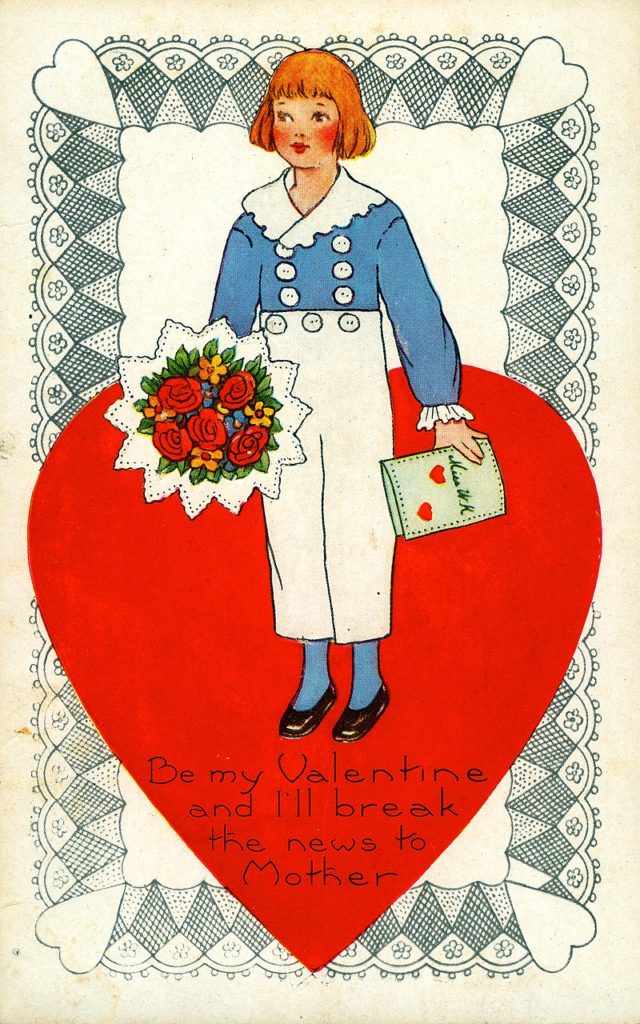Pine Mountain Settlement School
Series: DANCING IN THE CABBAGE PATCH
Series 09: BIOGRAPHY
Olive Dame Campbell
Marguerite Butler
Letter: Danish Folk School Training
1922
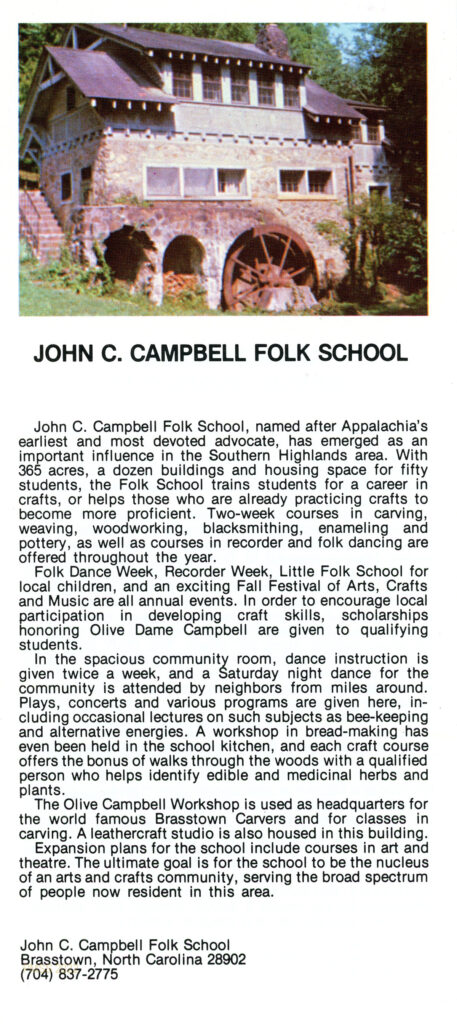
John C. Campbell Folk School. Early brochure for School [SIA_brochure_005] PMSS Collect.
: Olive Dame Campbell, Marguerite Butler, Georg Bidstrup, Denmark, Danish Folk Schools, folk schools, Progressive education, ASKOV School, Denmark, Daisy Gertrude Dame, agricultural schools,
OLIVE DAME CAMPBELL’S 1922 Letter on Danish Folk School Training (3 pages)
FOUNDATIONS
The early years of the twentieth -century were marked by a heightened interest in new educational models and particularly those that could remediate rural education in remote sections of the United States and also in other countries. The exploration of the Danish Folk School model was of particular interest to several of the earliest founders of rural residential schools in the Appalachians. The Danish Folk School model is one such program established in the 1830’s by its founder N.F.S Grundvig. Identified as a theologian, writer, philosopher, historian, educationist and politician, Grundvig had ample experience that was turned toward reform in educational practice. Danish Folk Schools still persist in some 70 schools throughout Denmark , testimony to their solid contribution to education for high school populations in Denmark and other countries.
OLIVE DAME CAMPBELL and the JOHN C. CAMPBELL FOLK SCHOOL
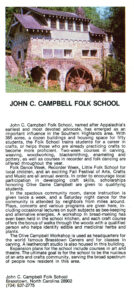
John C. Campbell Folkhad School. SIA_brochure_005
The following letter and supplemental literature located within the archive of Pine Mountain Settlement School was sent by Olive Dame Campbell to friends and colleagues at Pine Mountain Settlement School, including Katherine Pettit, whose letters contain the recorded report. The letter concerns Mrs. Campbell’s exploratory time spent in Denmark with Marguerite Butler, learning about the Danish Folk School educational model. It exposes the foundational differences between the Settlement School and the Danish Folk School models and sheds light on Olive Dame Campbell’s earlier trip to Denmark with her husband, John C. Campbell. Both Campbells had a deep interest in the foundations of the Danish Folk School model. Their interest led to the Scandinavian folkehøjskole idea as a model for the John C. Campbell Folk School and influential in the foundation of the Highlander Folk School in Tennessee begun by Myles Horton.
Folkehøjskole
Olive Dame Campbell and her husband were enchanted by what they learned of the Danish Folkehøjskole (Folk School) on their earlier trip to investigate the model schools. Following their return home they set their sights on a similar school that would model values they believed were compatible with educational needs in the Central and Southern Appalachians. Olive Dame’s husband. John C. Campbell unfortunately suffered a heart attack and died suddenly before the couple could bring their dream to fruition. Olive Dame vowed to continue the pursuit of their dream. The Brasstown, NC institution that grew out of the Campbell’s enchantment with the Danish educational model and the early work of N.F.S. Grundtvig, the philosopher, writer, and Lutheran Minister. The school that took shape following this second trip to Denmark was called the John C. Campbell Folk School in memory of Olive Dame Campbell’s husband.
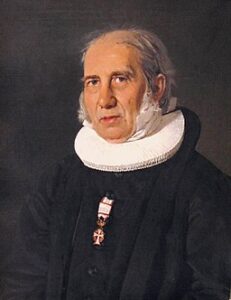
N.F.S. Grundtvig
Danish Folk Schools
Lutheran Minister, Philosopher, Writer, Theologian, Historian, Politician
Christian Albrecht Jensen
Public domain, via Wikimedia Commons” ”
When John C. Campbell died suddenly in 1919, the dream of a Folk School in rural Appalachia was put on hold for several years, but not forgotten. The Danish Folk School model never left Olive Dame’s thoughts and four years later she sought out her sister Daisy Dame and Pine Mountain Settlement School’s Marguerite Butler to travel with her back to Denmark to give a close second look at the details of the unique Danish educational plan. This time Olive Dame and her companions would fully engage the Folk-School program by actively participating in the programming and training. On this second trip, her sister Daisy Dame came along as an advisor and as a teacher with first-hand knowledge of rural schools in Eastern Kentucky where she had taught for a brief time and where her ideas and those of her sister led to an amalgam of educational philosophies regarding rural education in the Appalachian mountains.
MARGUERITE BUTLER
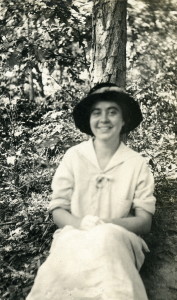
Marguerite Butler. [X_099_workers_2511_mod.jpg]
Marguerite was invited to come along on the Danish exploratory adventure with Olive Dame, as she had proved herself in her early years at Pine Mountain helping the founder, Katherine Pettit establish a small satellite settlement at Line Fork, near the Pine Mountain School. Marguerite was an enthusiastic follower of the new educational and vocational models that were being tried following the success of the urban Settlement Movement and the educational enthusiasm surrounding Jane Addams and Settlement advocates. Further, Marguerite Butler’s interest and enthusiasm for the Settlement Movement seems foundational to her interest in the Danish Folk School model while a student at Vasser. Certainly, her imagination had been captured by the proposed trip and she left Pine Mountain Settlement to join Olive Dame and her sister in their Danish educational quest.
FOUNDATIONS
Olive Dame had met Katherine Pettit on a trip to Eastern Kentucky in 1908-1909 when she and her husband. John C. Campbell, were travelling throughout the Central Appalachia, Katherine Pettit had already demonstrated her success in establishing Hindman Settlement. Working with May Stone she established a rural settlement in Knott County, KY. First called the W.C.T.U [Women’s Christian Temperance Union] School, Hindman Settlement School became the first of a series of rural settlement schools throughout Eastern Kentucky. But by 1913 Katherine had put her sights on founding another rural settlement school in near-by Harlan County. Olive Dame Campbell kept up a correspondence with Pettit and later with Marguerite and their work at the new Pine Mountain Settlement School and Olive Dame found kindred spirits in both of the early Pine Mountain Settlement School visionaries.
Marguerite Butler, was a talented Vassar graduate recruited by Pettit and who had demonstrated hands-on skills aligned with both the Settlement models and those of the Danish Folk Schools. Further, Marguerite was a remarkably resourceful and industrious young girl. She had been charged by Pettit to help plan and establish a new satellite settlement at Line Fork and received praise from all observation points — administration, community, and regionally. She was a model of Olive Dame’s vision of activism and the Danish model’s very hands-on approach. Soon, Olive Dame charmed Marguerite away from the Kentucky school by the offer of the trip to study the Danish Folk School and later, kept her near as a co-founder at Brasstown.
HOME AND THE WORK BEGINS
On their return to the United Sates, Marguerite and Olive Dame were firm believers in the Folk School model — with touches of the earlier Settlement School ethos. Marguerite became Olive Dame Campbell’s primary assistant in creating the new Brasstown Folk School after convincing the local community of the value of a new high school at Brasstown that would serve a very dispersed population. John C, Campbell Folk School was born in the heart, mind, and hard work of Olive Dame and Marguerite. They both had skills at community building and these talents were well demonstrated when the community of Brasstown, some 200 strong, gathered and endorsed the idea of a Folk School for their small community — and the building began.
The Danish educational model at John C. Campbell Folk School in Brasstown, North Carolina joined the best of Pine Mountain’s lessons to the lessons learned in Denmark, as described in the following letter. Marguerite and Olive Dame Campbell were to spend the remainder of their lives at the school named for Olive Dame’s husband, John C. Campbell and Marguerite soon planted roots even more deeply, when she married a Danish farmer recruited from Denmark, Bjorn Bidstrup, and she became Marguerite Butler Bidstrup.
The relationship between the two rural schools, one a Settlement School and one a Folk School, remained fixed by their shared objectives for better answers to the needs of rural education. Some Pine Mountain staff, such as Leon Deschamp, a former worker at Pine Mountain and his wife May Ritchie Deschamp [older sister of folk singer Jean Ritchie], are two notable transplants to the North Carolina Folk School. A transcription of an oral history by Marguerite Butler Bidstrup gives more depth to these interesting and important transitions and collaborations.
Today John C. Campbell continues its valuable work with the rural community in the surrounding Brasstown area but has broadened its scope to include a large Arts and Crafts influenced program that has gained National and International recognition and participation.
The other journey influenced by the Danish Folk School model, found in the person of Myles Horton, who also took the journey to Denmark to study the ways of the Danish Folk School model, is well documented. When he came back to found the Highlander Folk School in Tennessee , he led the institution toward grass-root social protest against bigotry and social ills … but that is another story that needs another telling and the story is a good one.
The success of the Danish Folk School model at the John C. Campbell Folk School at Brasstown, North Carolina. may be read in the basic tenets spelled out in the following letter by Olive Dame Campbell to Friends.
LETTER OF OLIVE DAME CAMPBELL FROM COPENHAGEN, DENMARK
October 1922
TRANSCRIPT [shared copy in PMSS collections — not yet scanned]
The following form letter has been received from Mrs. Campbell. She asked if I would have copies made and one sent to you. I do this with great pleasure. F. J. Clark
Copenhagen, October 6, 1922
My Dear Friends:
Having been here now for over six weeks I think it is perhaps time for me to register some impressions. I am new at the machine and shall doubtless turn out a bad sheet. Moreover my thoughts do not flow as rapidly or as logically this way as they would at the end of a pen. Such as they are, however, I can share them with more of you, and you will find them much easier to read.
You may know. that there are three of us here. Marguerite Butler of the Pine Mountain Settlement School. My sister Daisy Dame who has been a teacher. for many years (one of which she spent. getting a kindergarten started in a Kentucky Mountain County), and myself. I wish greatly that there were several more. We are already finding it valuable to check each other up. Moreover, there are so many things that can be arranged for a group as well as for one person, especially conferences with busy important people who do not speak English well enough to care a great deal about going over the same ground many times. Then. so much time is saved by passing along information to each other. We have been fortunate in finding two of last year’s American-Scandinavian students still here. Their help, particularly one who has been studying agricultural cooperation, has been invaluable.
Except for two weeks trip into Jutland to visit Askov, the most famous of the high schools, to talk over our course of action with several leading people and to get something of an idea of the country before winter closes in, we have been here in Copenhagen [Denmark]. We shall remain here until Askov [a Southern Jutland Danish High School] opens. early. In November. And then go back there for a month as pupils!
Of course, one cannot get a great deal of first hand information on the high schools here. In fact, It is quite amazing how little the average Copenhagener one meets. knows about these schools which. are bringing educators from all over Europe. There is a distinct line between. city and country. Or more exactly between Copenhagen and the rest of Denmark. Inquiries are often dismissed with the statement that these schools may be all well enough, but that they are of course, for peasants! On the other hand, we find that students, particularly women of the other groups, are beginning. to attend Askov, where some of the finest lecturers in the country are situated. Another factor is that the high schools are in no way connected with the state system. each being more or less a law unto itself, —– that is, depending upon the peculiar point of view and the personality of its “forstander” or principle. In spite of the fact that so many are subsidized by the state no special track of their activities seems to be kept at headquarters and one has to do his own hunting. and get what help he can
page 2
through personal introduction. publications (practically all in Danish) and being passed along from one school to another. The University, which is a severely technical institution, is frankly indifferent, although of course there are interested individuals in the faculty, some of whom have actually taught in the high schools. Fortunately, the Minister of Education, Herr Appel, is himself a high school man — the former head of Askov, which his wife now runs. He is a fine big person, speaking broken English but most helpful and human. One can get to him and other people of importance quite easily, although my connection with the American Scandinavian Foundation has greatly facilitated matters.
There are also here in Copenhagen three high schools for trade-union and industrial groups. run somewhat on the lines of the country ones without the important residence feature. We have already established pleasant relations with the head of one a famous old man named Borup. [ later, literally Borup’s Folk High School]. His account of his work and his outline of his conception of what such education should mean has been one of my most stimulating experiences so far. His classes begin this week and we expect to attend some of them frequently. We shall, of course, visit the others too. It is. besides valuable to get the reactions of various kinds of people here not connected with educational and social work.
Our visit to Askov makes us a bit restless to be in the city fascinating as Copenhagen i— and more. keen than ever to get to the heart of our study. I wish you might have been with us at the big fall reunion which we attended two weeks ago. Every year the old students come back 1000 to 1500 strong and stay at the school visiting. and eating together and listening to lectures of all kinds. Old men and women were there who had attended the school over 30 years or more before. One old man of 70 odd [yrs] had been at the original school at Rodding. You can’t imagine how interested he was in us and how persistently he tried to talk to us in spite of our very evident, painful, Danish fragments of speech. It was a picture to see him drive away in a big farm wagon, heaped high with bedding, which each comer must himself supply. A number of the women spoke fairly good English so we had an opportunity to talk. which they were eager to do. There were, too, quantities of young men and women fresh. and intelligent looking. The Deans have a great sense of humor. And these young people get, I think, a great deal. of entertainment out of our conversational. difficulties, I don’t blame them and they were. very polite about it. All these people, old and young together, sat through four one-to-one-and-a- half hours lectures each and every day. [They] came again in the evening to music. stereopticon pictures, et cetera, Some of the subjects of the lectures were present day conditions in Belgium. Educational conditions, and Schleswig. (newly returned to Denmark), two educational addresses, one by. Minister Appel, two religious addresses (along what. line I could not determine), two on prayer and work, one on modern Danish art, one. on Abraham Lincoln by a. Dane who has taught in a People’s High School in Des Moines [IA] among the Danish. It was a curious feeling to hear him come out in English with. “… a government of the people, for the people, by the people”… Repeating this emphatically and slow a number of times, writing it on the blackboard and translating it into Danish. I could understand that he said this was the foundation of one of the American ideals. Of course. I could understand very little of
page 3
the addresses. but it was evident that each speaker was using the full. force of his personality and the. audience responded with absolute silence or with ripples of laughter. Imagine what such lectures and such connecting links year after year must mean to the people scattered out in the little farms. The government meets the expenses. The people paying the nominal sum of five Cronin (about $1,10 a day at this exchange). By the way, there seemed to be no checking system. A man simply sat there in the open court, ready to take the money. Our coming to stay at Askov, where some of the leaders are situated. Is going to be a most valuable one and from there we will be. directed and introduced to the smaller schools. Askov itself. Is an extended high school — no student being allowed who has not had a session at one of the smaller schools. There are, of course, No examinations for admission.
I suppose you are wondering all this time about the language. It is difficult. We have an excellent teacher here and unusually good little grammar with the phonetic system. But while the. construction is like English and many of the words for that matter, the pronunciation. Is anything but English in sound. It is a guttural, breathless kind of language and I question if any one but a Dane will ever be able to pronounce its Gs and Rs and Es correctly. We are persisting valiantly with the reward that we can usually be understood when we ask simple questions. We can also understand simple answers and are beginning to get snatches of what we hear in lectures. We must get it. That is the first advice everyone gives us. It is evident to us that a statement of general methods and courses. Is not going to give us the secret of how the information is given, nor, as I said before, the various angles presented by the lecturers each. of whom is expected to use his personality to the utmost —- this. involving the frank expression of his own point of view, Each school will thus be individual and how Individual and how. the individuals average up, we must decide for ourselves.
Our time here in Copenhagen is therefore a necessary and valuable study.. It would be more valuable still, could we make use of the fine libraries here. There is much reading we shall have to do as soon as our Danish is more proficient. It does seem a pity when we are putting out so much time and energy on these details that we cannot share our experiences with others who might be able to come only for a few months. With what we could jointly translate and give through talks with people who speak English, (we will be ready to direct to those who have given us the most help). and through what one could see for himself, a shorter stay ought to be very profitable. It is not expensive living here. One can cover the essentials for about $60 a month. Passage on the one class steamer of the Scandinavian-American Line brings you straight to Copenhagen and $150 will give you a good birth, So I am continuing to hope that some of you will still come over — Perhaps make a sudden start and join us at Askov early in November. Think it over well. Do !! Fine clothes are neither needed nor desirable. Plenty of comfortable shoes. Warm things, and rain things. I can. always be reached sooner or later through the international Students Committee. Studiestrasede [?] 6 Copenhagen, and I would. of course come back again to Copenhagen to meet anyone if I knew in time. Later, I will try to write again as to what we find. I wish I had time to write of all the interesting incidentals. With regard to all.
Sincerely always.
(signed) Olive D. Campbell.
See also:
Bodene-Yost, Zizanie (2013) “in the U.S.: The Failure of the Danish-American Folk High Schools vs. the Success of Highlander Folk,” The Bridge: Vol. 36 : No. 1 , Article 9.
Available at: https://scholarsarchive.byu.edu/thebridge/vol36/iss1/9/
Free and open access article by BYU ScholarsArchive. It has been accepted for inclusion in The Bridge by an authorized editor of BYU ScholarsArchive.
SEE ALSO
